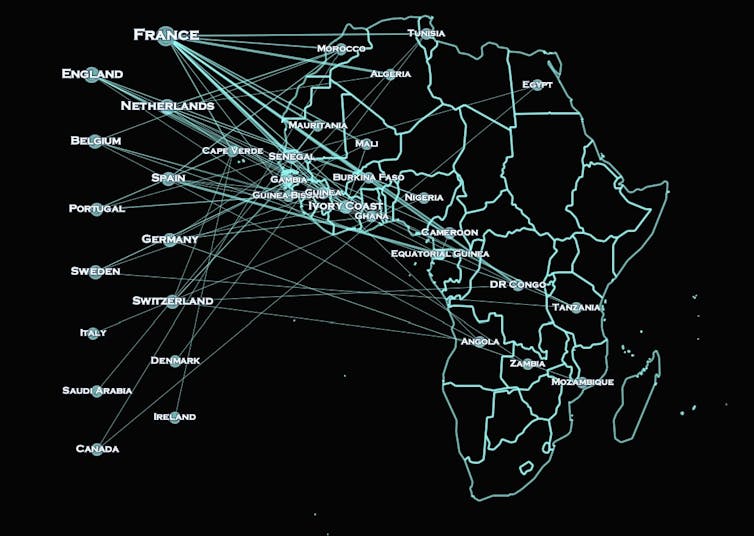Almost a third of the players who play for their national team at the Africa Cup of nations (Afcon 2023) were not born in Africa. If recruiting players from elsewhere can temporarily strengthen African soccer, can it have harmful long-term consequences?
The Africa Cup of Nations (Afcon) is approaching its conclusion in Ivory Coast and speculation is rife about which team will be the ultimate winner. It could be one of the continent’s footballing heavyweights such as Morocco or Senegal. Alternatively, a relative minnow like Angola or Cape Verde may emerge as the unexpected victor.
Last time out, at the 2021 edition in Algeria, Senegal captain Kalidou Koulibaly lifted the trophy. Before that, Algeria’s 2019 triumph in Egypt saw Riyad Mahrez become the victorious captain. Significantly, neither player was born in Africa and there is a distinct possibility that the winning captain of this year’s tournament will also have been born elsewhere.
200 non-African-born players
Of the 630 players who were registered to play by teams competing in the 2023 edition, 200 weren’t born in Africa. The non-African country with the most players at the tournament is France, with 104. Second is Spain with 24, then England with 15. Even players born in Ireland and Saudi Arabia are competing in this year’s tournament.
The Moroccan national team has the largest number of diaspora players. Eighteen of its squad members were born outside of Morocco, with only nine born in the country. Equatorial Guinea and the Democratic Republic of Congo have 17 and 16 diaspora squad members, respectively.

The phenomenon seems to be on the rise and has allowed some African teams (and several with very limited footballing history) to rise up the footballing ranks in recent years. But some people argue that diasporas are undermining the progression of African football, principally by engendering a culture of complacency.
Bolstering their ranks
The fact that African teams are increasingly relying on players born elsewhere is not a surprise. After all, there’s an intense talent battle taking place in world football. This often involves the naturalisation of individuals who find themselves playing for one national team even though they may already have played for another, and the targeted recruitment of players in countries around the world.
However, the case of Africa is particularly distinctive. It’s a reflection of both the continent’s colonial past and its global diasporas.
For instance, Mahrez was born in Paris to parents of Algerian and Moroccan origin. The French capital is home to 331,000 Algerians and 254,000 Moroccans. Koulibaly was also born in France to parents originally from Senegal. Figures suggest there are more than 100,000 Senegalese in France.
But this is not just a story about France. Nigeria’s Ademola Lookman was born in London, Ghana’s Iñaki Williams comes from Bilbao in Spain, and Morocco’s Sofyan Amrabat and Hakim Ziyech are of Dutch origin.
Read also: Africa Cup of Nations: China deploys its “stadium diplomacy”
Self-identity and family dynamics are a couple of reasons why players choose to play for teams from the birthplaces of their parents rather than their own. In 2022, Ziyech explained it thus: “Choosing one’s national team is not done with the brain but with the heart. I have always felt Moroccan even though I was born in the Netherlands. Lots of people will never understand.”
Williams has spoken of his grandparents’ influence, claiming that a decision is “easier when you see the [Ghanaian] people and your family support you to be a Black Star”. Such instances reveal a multidimensional sense of place.
Yet cynics argue that other such players are simply not good enough to play for the European nations in which they were born or in which they have been naturalised. For instance, former Arsenal starlet Alex Iwobi has gone from being a potential future England star to a sometimes criticised Fulham midfielder and Nigerian international.
But at what cost?
Others express concerns about how diasporas are undermining African football. One concern is that bringing talent in from Europe and elsewhere is simply a fast-track strategy to success that is eroding the long-term health of football across the continent.
Even so, the approach seems to be working. At the Qatar World Cup in 2022, Morocco became the first African nation to reach the tournament’s semi-final stage. This has helped the country become the current highest-ranked team in Africa and the 13th-best team worldwide.
Senegal is also in the world’s top 20, while Cape Verde’s recent performance shows that even Africa’s traditionally less successful footballing nations can prosper. Cape Verde, a string of ten islands in the Atlantic Ocean with a population smaller than the city of Bristol, just finished top of a tough group, including Egypt and Ghana at the 2023 Afcon.
The likes of former Cameroon goalkeeper Joseph-Antoine Bell remain less positive about such achievements. Bell claims that diaspora players make the job of African football’s leaders, managers and coaches too easy, which is engendering a culture of complacency. He also thinks it demotivates players born, brought up and living in Africa.
Though the practice of diasporic talent recruitment appears to be increasing (the effect of globalisation must also be acknowledged as an influence), there are still some countries that rely more on players born and brought up domestically – Namibia and South Africa are examples of this.
Read also: Why do ex-French Sub-Saharan colonies fare better economically than ex-British ones?
Bell would no doubt approve, having previously called for Africa to develop its own solutions to talent identification and development. The problem is, this takes time, money and patience – precious commodities in football generally, not just in Africa.
Whatever happens when the tournament’s final game is staged at the Alassane Ouattara Stadium in Abidjan, it will be a proud moment for and a big celebration of African football. However, the birthplace of the captain who eventually lifts the trophy will probably fuel further debate about the importance of African football’s diasporas.
This article is republished from The Conversation under a Creative Commons license. Read the original article.






